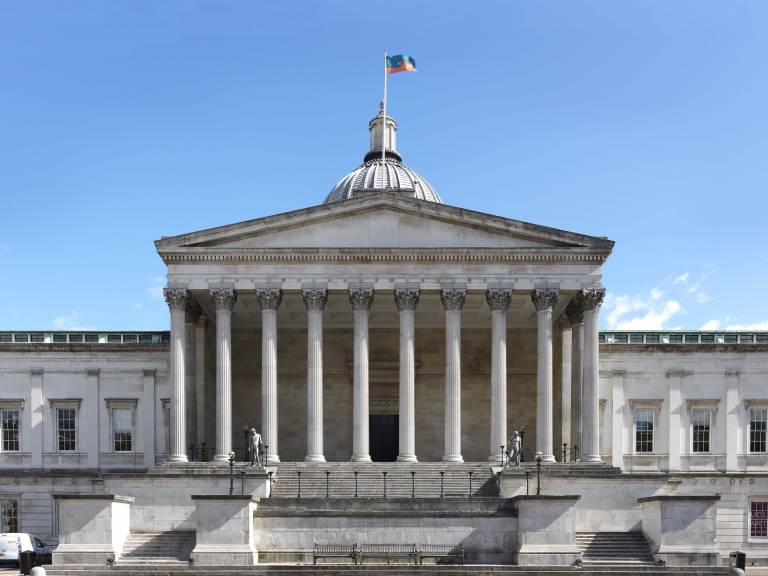Student blog - Inaugural Lecture | Schools, Houses, Fruits, Taxes and Other Differentiated Products
4 November 2019
Written by Tom Gray, BSc Economics student, UCL Economics

The Inaugural Lecture Series is an opportunity for each department to celebrate the achievements of newly promoted professors. It is nearly impossible for any professor to summarise their entire intellectual and academic career in just 45 minutes, let alone a researcher as distinguished as Lars Nesheim. However, in this short time, he managed to give an insight into his own theories on differentiated product analysis while simultaneously providing a fascinating insight into economics as a discipline.
Differentiated Products Analysis
Delving straight into the topic with an example, Professor Nesheim started by asking everyone in the audience a deceptively simple question: ‘Does the quality of the school or the student affect academic results more?’ While everyone in the hall was busy justifying their own conclusions, he threw in another question ‘...and how can you tell?’
This ‘how’ and ‘why’ lies at the centre of every economic question and by extension every question concerning household choices and the government policy affecting them. As much as Professor Nesheim’s lecture was about discussing the various specific research projects he has been involved in, it was also about the fundamental economist’s dilemma of trying to produce a deterministic model from an observable dataset.
To investigate any question on differentiated products and household sorting, Professor Nesheim works along three basic assumptions:
- Products are differentiated by both observable and unobservable characteristics
- People are intrinsically heterogeneous
- Households sort based on willingness to pay
Laying out his methodology, the full scale of the challenge became apparent. It is obvious to anyone that to reach a conclusion, the effect of the variables ‘quality of student’ and ‘quality of school’ have to be compared, but in a world where test results are widely used to categorise the quality of young people, how do you do this holistically before examinations? Simultaneously, what really makes a school good? Even school standards boards like Ofsted use terms such as ‘good’ and ‘satisfactory’ which are harder to quantify than a continuous data set. School quality and student outcomes themselves are biased measures because parents choose where to live which influences the corresponding school district.
Professor Nesheim solved this by working with a framework of expressing education as a production function with a joint model of households selecting a school by proxy of housing. With other determinants such as peer effects, unobserved ability and unobserved luck being held constant, school quality was found to have a relatively low impact on student outcomes, with parental education and income proving to be much more significant determinant factors of test scores.
Other Applications
In the example of education the function p(q) described the ‘price’ of education relating to house prices. Professor Nesheim went on to show how the concept of a price function can effectively be applied to any differentiated goods model when the price function is viewed as a ‘membership fee’. This may seem counterintuitive when examining public goods such as education and infrastructure, which to the end user appear free but just like a private members club, the feasible use of these goods is restricted to access options. A heat map of house prices showed a remarkable spike around quick access to the motorways in Greater London suburbs. With the same methodology outlined in his introduction, Professor Nesheim showed how examining large scale datasets and applying the theories of differentiated products to household sorting, an immense number of empirical investigations can be carried out ranging from government sponsored inquiries into public infrastructure investments to how the price of cherries affects the price of bananas.
Speaking to a diverse group of students, PhD candidates and academic peers, Professor Nesheim’s inaugural lecture was of immense interest to economists at every level and managed to simultaneously cover the fundamentals of his work while also providing an insight into the far reaching consequences of the results he found.
Listen to Lars' lecture:
Inaugural Lecture Series 2019/20
This lecture is part of the 2019/20 series for UCL's Faculty of Arts & Humanities and Faculty of Social & Historical Sciences. The series provides an opportunity to recognise and celebrate the achievements of our professors who are undertaking research and scholarship of international significance, and offers an insight into the strength and vitality of the arts, humanities and social sciences at UCL.
All our lectures are free to attend and open to all. You don't have to be a UCL staff member or student to come along.
Lectures begin at 18:30 and are typically one hour long. A drinks reception will follow, to which everyone is welcome to join.
We look forward to meeting you at one of our events.
For information on other upcoming lectures please visit: https://www.ucl.ac.uk/social-historical-sciences/news-events/inaugural-lectures
 Close
Close

